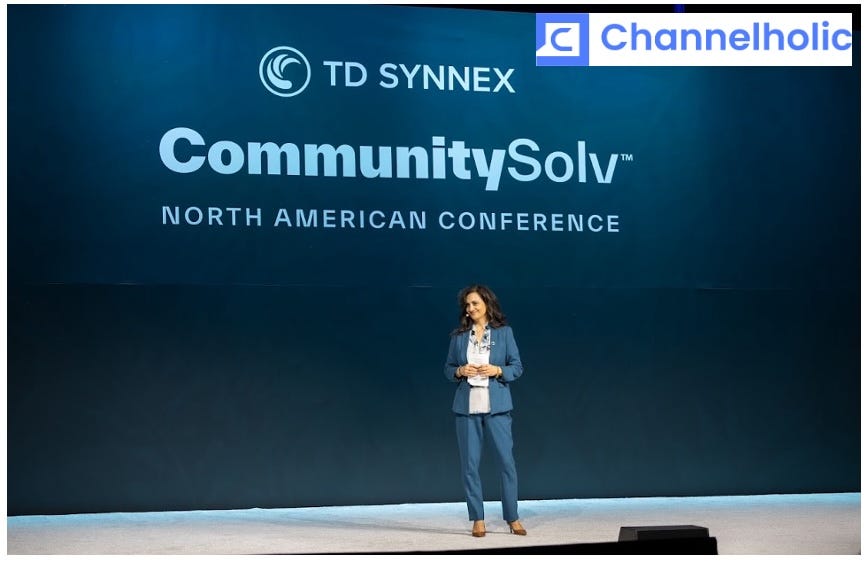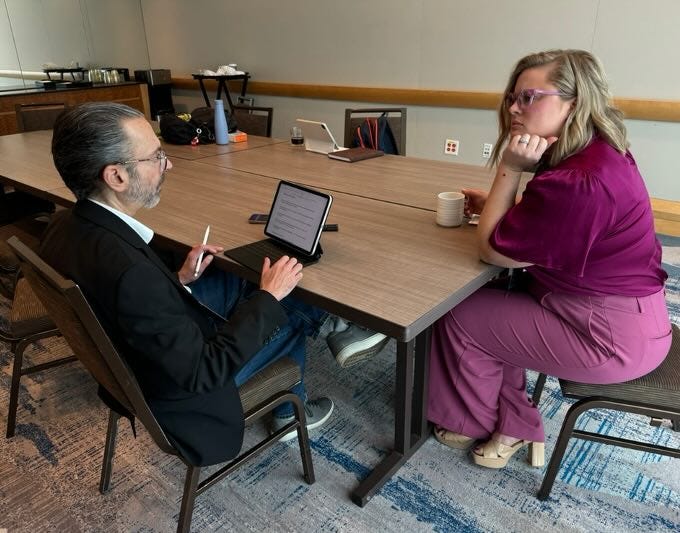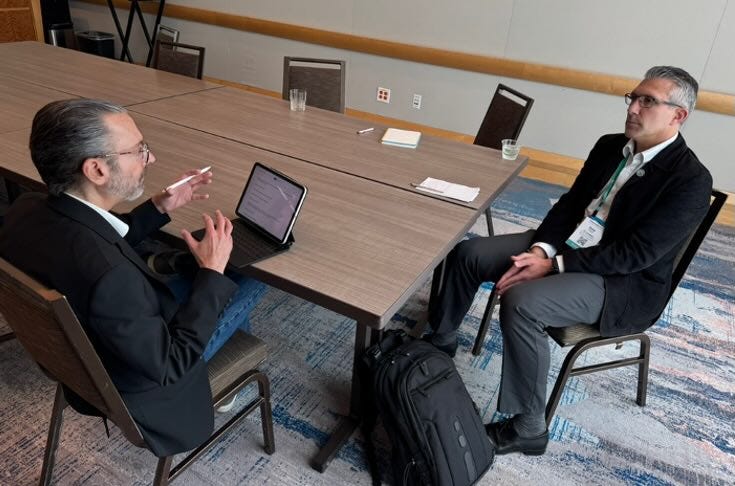Ecosystems Need Communities
And vice versa, for reasons a TD SYNNEX conference this week revealed. Plus: What N-able’s acquisition of Adlumin reveals about its thoughts on integration and the future of MDR.
There were a lot of TD SYNNEX executives at the Canalys Forum event I attended in Miami a few weeks back. Reyna Thompson (pictured above), who officially takes over as the distributor’s North American president next month, was among them. Judging by what I learned this week about her strategy heading into 2025, I suspect she found much of the content at that show encouraging.
As regular readers will recall, Canalys generally and chief analyst Jay McBain specifically emphasized during the conference that at a time when businesses increasingly want solutions rather than products and those solutions are growing more and more complex, everyone in the channel needs a collaborative go-to-market ecosystem to compete and win.
It's not hard to spot the parallels between that thinking and the three themes Thompson outlined during her keynote at this week’s North American meeting of TD SYNNEX’s CommunitySolv partner community in Fort Lauderdale, Fla.:
Win together by collaborating with vendors and partners offering complementary hardware, software, and services.
Dare to go into TD SYNNEX’s top three high-growth markets: AI, cybersecurity, and cloud computing. Collectively, sales of those and other components of the company’s advanced solutions portfolio outgrew sales of endpoint solutions by 140% in the most recent fiscal quarter.
Get stuff done by cultivating operational excellence.
I’ll come back to themes two and three later in this post but want to begin by discussing the first, because it’s absolutely and explicitly an ecosystem play, but with an interesting disti-specific twist.
That play’s origins stretch back well before the Canalys Forum. Bob Stegner (pictured right below), who will soon step down as SVP of marketing at TD SYNNEX after 17 years at that company and another 10 at Ingram Micro, has been downright startled for a while by the degree to which vendors are closing deals alongside one-time blood enemies these days.
“They don’t have a choice,” he says. “They have to do it, because it’s all solutions based.”
And when it comes to something like AI especially, no one can deliver complete solutions on their own. That very much includes MSPs, solution providers, and resellers, according to Thompson, and they know it.
“They’re coming to us and saying, ‘okay, look, I haven’t been part of this ecosystem. Help me meet the relevant players,’” she says.
Which is exactly what Thompson intends to do, and which also explains why former marketing exec Kristi Kirby is now senior vice president of North American communities, a newly created post responsible for helping partners form ecosystems.
“Technology is too complicated to be an expert at everything for most partners,” says Kirby (pictured left below). “The only way it works is if you can have a group of trusted partners that you can work with.”
The critical word there is “trusted.” Partnering with other partners has been a smart move at least some of the time for MSPs, resellers, and others for years. Lack of trust is precisely why they’ve so rarely done it. Give a potential competitor even a toe in the door with my clients, they worry, and I’m all too likely to lose them, either to poaching or in response to poor customer service.
Unless, of course, that potential competitor isn’t so much a potential competitor as someone you know personally through a community of the kind that distributors—and a lot of vendors for that matter—have been operating for a long while. “That’s the beauty of a community,” Kirby says. “It helps bring down some of those barriers.”
Which is why Thompson has Kirby devoting 100% of her time now to communities. “Her whole vision for this is making sure that TD SYNNEX is sitting in the middle of this ecosphere and being a connector, not just with the vendors and the partners but with all the ways technology is bought in this industry and all the folks that influence the buying cycle,” Kirby says.
Of course, it’s hard to know how much faster ecosystems form or how much further they go when communities are involved. Community members have been known to steal clients from one another in the past, too, which is why community hosts like TD SYNNEX usually have rules in place to keep everyone honest.
“Trust is important, but it’s always nice to have a backup process,” Stegner observes.
Still, I’m starting to wonder if a community of some kind is an ingredient no complete ecosystem recipe can do without. End users, as McBain often notes, increasingly prefer buying from suppliers without ever talking to a human. IT business owners want to look the people they go to market with in the eyes and judge if they can be counted on to do the right things. Communities make that kind of trust-building possible.
Stegner doesn’t see that changing any time soon either. Much is different in the tech industry since the days he sold no-name PC memory modules for 40 points of margin, but one thing remains true.
“People like to deal with people, and relationships matter,” Stegner says.
High complexity, high price tag, high growth
Ecosystem building is an especially big priority for TD SYNNEX in AI, cybersecurity, and cloud computing, the three high-growth markets I referenced before. CommunitySolv partners who “dare to go” into AI especially, according to Thompson, are hungry for introductions to appropriate vendors.
“They’re scaling beyond their core in terms of technologies, and so they need us to be that connector,” she says.
TD SYNNEX is only too happy to oblige, and for good reason. According to Gartner, worldwide information security spending will rise 15% next year to $212 billion while public cloud sales will climb 21.5% $723.4 billion. Per Bloomberg Intelligence, meanwhile, generative AI revenue will soar over 171% to $219 billion next year on its way to $1.3 trillion by 2032.
High growth indeed.
All three markets are performing well for TD SYNNEX partners as well. Security, hybrid cloud, and AI were in fact the top three solutions that respondents to the distributor’s newly published 2024 North America Direction of Technology report plan to offer in the next two years. Calhoun McKinney (pictured), senior director of go-to-market strategy and enablement for TD SYNNEX North America, isn’t surprised given how intertwined those fields are.
“You’ll continue to see them all grow together,” she predicts. “When you look at environments where there’s high complexity and a high price tag, you’re really going to see high opportunity.”
TD SYNNEX has introduced a steady stream of resources to help partners pursue that opportunity, starting with Destination AI, an enablement program launched last summer that offers everything from training courses and sales playbooks to pre-built demos and proof-of-concept labs. A practice accelerator added last month helps partners build solutions around AI-related needs in their customer base, which a team of AI advisors can help them identify.
“It’s very much a consultative approach,” Thompson says.
To meet demand for AI functionality partners have never had to think about until recently, meanwhile, TD SYNNEX has been adding six to eight new vendors to its line card every month. “We’re gathering up hundreds, literally hundreds, of smaller vendors many of which you’ve not heard of but that fill a niche,” said Mike VanGieson, the distributor’s executive vice president of product management, during a Tuesday keynote. Those efforts are paying off too, according to McKinney, who says that sales by CommunitySolv members through newly added AI, cloud, and security vendors are up 600% in the last year.
There’s work to be done though in another critical part of the high-growth revenue recipe. Services for AI alone in areas ranging from assessment to deployment to management will be a $40 billion market in North America over the next five years, according to Gartner, and TD SYNNEX has multiple ways to help partners pocket some of that spend. Those include AI Launchpad, a comprehensive set of outsourced services for partners with no capacity of their own, and AI Boost, a more targeted offering for partners who just need to close a gap or two. Both can be added to an order like any other software or hardware SKU an end user requires.
“Our motto is easy to buy and easy to sell,” says Senior Vice President of Services Joe Pittillo.
Even so, just 7% of TD SYNNEX’s motivated and engaged CommunitySolv members are selling services in any of the three high-growth sectors at present. “I think we’ve got an opportunity to do some more training about what’s available,” Pittillo says.
McKinney agrees. “It’s such a game changer and we really have seen partners’ businesses transform when they lean into services,” she says. “We can’t talk about it enough.”
Not that TD SYNNEX partners are failing to get in on AI as it is, mind you. According to the Direction of Technology report, just 14% of them in North America closed no AI deals in the last 12 months and only a microscopic 3% expect to close none in the 12 months to come.
Getting (integration) stuff done
Getting stuff done, the third and least novel of Thompson’s themes for 2025, is something TD SYNNEX considers a core and never-ending pursuit. “Driving efficiencies, driving productivity, driving SLAs,” she says. “It’s always been a priority. It always will be a priority. Execution is key.”
It's also, at first blush, motherhood and apple pie for distributors, which have been judged by how promptly they quote, ship, process returns, and the like for decades. TD SYNNEX has more interesting openings for operational excellence in mind, though, as became clear during a conversation this week with Nate Herz (pictured), the company’s senior vice president of business operations, about a new initiative called Digital Bridge.
The issue it addresses is a familiar one to partners of all kinds but especially MSPs, who spend most of their time in a PSA, CRM, or ERP solution but have to swivel chair over to TD SYNNEX’s ECExpress e-commerce platform to view pricing, check availability, and place orders. Unless, of course, they have the time, money, and skills to integrate their PSA/CRM/ERP system with TD SYNNEX’s database using one of many APIs. Which, unless they’re pretty big, they probably don’t.
Enter Digital Bridge, which will offer partners a menu of ready-made, plug-and-play connectors linking TD SYNNEX’s back end to a growing list of popular business management systems, including ConnectWise PSA, Kaseya’s Autotask PSA, Salesforce, ServiceNow, NetSuite, and HubSpot.
“We’re democratizing integrations with TD SYNNEX,” Herz says.
Similar connectors from TD SYNNEX’s StreamOne cloud marketplace to ConnectWise and Autotask have been available for a while, he adds, but this is the first time they’ve been available for the rest of the company’s ordering infrastructure. The projected results for TD SYNNEX and its partners alike include faster ordering workflows, lower IT costs, and easier cross-ecosystem collaboration.
“It really kind of blurs the lines between the systems that partners are using and the systems that we’re using,” Herz says.
It also exemplifies another, smaller TD SYNNEX priority that several leaders referred to loosely this week as “meeting partners where they’re at.” Like Microsoft Teams, for example, which many partners spend their day in and which is therefore on the initial list of nine Digital Bridge integration targets.
“They’ll be able to do things like check order status, check price, and check availability all from within their Teams environment,” Herz says.
Digital Bridge is currently in the very early stages of testing with CommunitySolv members but will reach every TD SYNNEX partner at some point next year. The impact, Herz predicts, will be significant.
“The business that runs through our current APIs is in the billions of dollars,” he says, despite all the dev work required. That’s a big number in absolute terms but more modest relative to the more than $57 billion of revenue TD SYNNEX reported during its 2023 fiscal year or the $14.7 billion it recorded in its most recent fiscal quarter. Imagine how much more ordering happens and money gets saved when pretty much everyone can process orders self-serve through the systems they’re already doing everything else in.
“We’re super, super bullish on this,” Herz says.
N-able goes deep on MDR
They may not agree on much, but Kaseya and N-able do share one belief in common at least. Some integrations can only be done properly if you own the source code at both ends.
We know Kaseya believes this because it’s built a large part of its strategy around that conviction, and because its CEO says as much regularly. We now know that N-able agrees—about some integrations some of the time—too based on the reasoning behind its decision to acquire Adlumin, the security vendor that’s been running N-able’s MDR solution behind the scenes since that service reached market early this year.
“We can build deeper, broader, and more impactful integrations between our products than we could in a partnership,” explains N-able CEO John Pagliuca (pictured) in remarks emailed to Channelholic. He has a more specific integration opportunity in mind, too.
“Security, in many ways, is a data problem. By building deeper connections between Adlumin’s advanced security operations platform and N-able’s leading IT management and security platform, N-able can bring more data to bear and drive better security outcomes,” Pagliuca writes.
Better security outcomes, as we know, are very much on the minds of senior leaders at all of the big managed service platform providers these days. Kaseya, for example, recently bought security vendor SaaS Alerts in conjunction with the release of its new Kaseya 365 User security solution. ConnectWise, meanwhile, is now run by a security industry veteran with plans to deepen and widen that vendor’s already expansive security portfolio. And Pagliuca said N-able’s strategy is “anchored” in security during a recent conversation with yours truly.
A few other observations about this deal:
1. It very much reflects the world’s yawning cybersecurity skills gap, and that gap’s promising implications for providers of MDR, SOC-as-a-service, and other managed security services. Indeed, MDR is N-able’s fastest-growing solution at present, according to Pagliuca, and Adlumin is expected to exit 2024 growing at an over 60% clip.
“The human piece of security isn’t going to go away, no matter how great the technology is,” Pagliuca says. “We all know that the shortage of skilled cybersecurity labor has consistently been a major industry challenge. And even when the right human talent is found, it can often be cost-prohibitive. The MDR piece of this goes a long way in helping to resolve this challenge for our partners.”
2. It hints at a broader ambition by N-able to add new kinds of partner serving new (as in bigger) clients. “It unlocks complementary channels,” says Pagliuca of the acquisition. “We have a strong MSP channel; they have strong reseller and upmarket relationships.”
Also worth noting
SuperOps has named Malwarebytes its strategic security ally.
The latest addition to Syncro’s Smart Ticket Management suite is a new ticket sentiment analysis feature designed to help techs separate urgent issues from inconveniences.
Microsoft’s excited about what AI agents mean for partners. So is Google. So am I. Post on this topic coming soon.
Hornetsecurity has a new solution for managing DMARC, DKIM, and SPF configurations.
Exabeam and Wiz are partnering on cloud threat detection, investigation, and response.
Big week for Cysurance. They’re now available to Sophos partners in Canada and Bitdefender partners everywhere.
KnowBe4’s new “human risk management” platform merges security awareness training with email security.
Blackpoint Cyber now has verified Small & Medium Business (SMB) solution status in the Microsoft Intelligent Security Association.
Deep Instinct’s data security platform now supports Amazon S3.
MorganFranklin’s new MDR service is powered by software from Stellar Cyber.
1Password solutions are now available through Ingram Micro.
Zoom solutions are now available through Jenne.
HPE’s Partner Ready Vantage program now has centers of excellence for managed services, support services, and professional services.
HPE’s GreenLake platform, meanwhile, has new hybrid cloud management capabilities.
Mega MSP alert: NETRIO and SUCCESS Computer Consulting (two names, one company) have acquired Buffalo, N.Y.-based PCA Technology Group.







